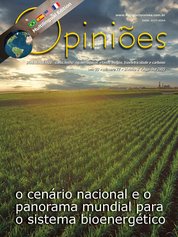Mário Campos Filho
Presidente do Fórum Nacional Sucroenergético e da Siamig - Associação das Indústrias Sucroenergéticas de MG
OpAA77
O futuro promissor do sistema bioenergético brasileiro
A agroindústria brasileira da bioenergia está alinhada com o cenário global atual, focado em sustentabilidade e responsabilidade socioambiental. O setor produz, de forma sustentável, sendo gerador de muitos empregos e renda, além de possuir uma forte governança em relação a riscos e regulamentações. Esse alinhamento com a tendência mundial (ESG) é considerado essencial e ganha ainda mais solidez a cada dia.
Desde suas origens, a agroindústria bioenergética baseia-se no conceito de economia circular, aproveitando ao máximo os insumos e resíduos. A partir da cana-de-açúcar, são produzidos alimentos e bioenergia, aproveitando também os subprodutos para otimizar a produção.
Da mesma forma, a produção de etanol de milho já nasceu com esse mesmo conceito. Essa abordagem circular está em sintonia com o que o mundo busca hoje: maneiras mais sustentáveis de produzir com menor pegada de carbono.
O setor bioenergético brasileiro desempenha um papel essencial nesse contexto. Mesmo ocupando apenas 1% da área do país, é responsável por quase 20% da energia produzida no Brasil. Ao longo dos anos, o setor desenvolveu um sistema de produção escalável e distribuído por todo o Brasil, tornando seus produtos sustentáveis e acessíveis aos consumidores.
A capacidade do setor na geração de energia é notável, quando comparada a outras fontes renováveis, o que fortalece sua posição na matriz energética brasileira. Essa integração entre o social e o meio ambiente é um diferencial importante, permitindo uma grande contribuição para um mundo mais sustentável.
Para continuar progredindo, é fundamental melhorar a eficiência do sistema de produção. Investir em tecnologias sustentáveis e eficientes para produzir a matéria-prima é essencial. Estima-se que a produção de cana-de-açúcar tem potencial para dobrar sua produtividade. Além disso, a criação de políticas públicas que incentivem o setor é muito importante.
Um exemplo notável é o programa Renovabio, que antecipou um movimento global e setorial em direção à descarbonização dos processos e ao estímulo de práticas conscientes de produção. O Renovabio quantificou esses esforços, e hoje já é possível observar na agroindústria a adoção de práticas com o objetivo de reduzir a pegada de carbono na produção, como a substituição de insumos derivados de petróleo, a racionalização do uso de máquinas e equipamentos, a substituição de insumos emissores de GEE, a utilização de biológicos e a captura de carbono, todas alinhadas com uma mentalidade de descarbonização.
Recentemente, o RenovaBio alcançou a marca de 100 milhões de CBIOs emitidos em 4 anos, ou seja, a emissão de 100 milhões de toneladas de CO2 na atmosfera foi evitada. Um dos principais desafios do setor é mudar o mindset do público em relação ao consumo de etanol. Mais do que apenas uma escolha baseada no preço, é importante que as pessoas considerem também as questões ambientais e sociais envolvidas.
O etanol é peça-chave para a mobilidade sustentável. Seu uso já está presente na frota convencional e há perspectivas de expansão com os veículos híbridos flex, em que há a aliança eficiente da eletrificação com a motorização convencional. O setor também tem um potencial na produção de SAF - combustível de aviação sustentável - uso na navegação e na produção do biogás e biometano. Também é projetado um futuro em que o etanol desempenhará um papel relevante na cadeia produtiva do hidrogênio.
Outro desafio que o setor enfrenta é o risco de regulações que podem afetar suas expectativas de oferta e consumo. No entanto, ao demonstrar para a sociedade que o biocombustível é uma alternativa alinhada ao que todos procuram – uma opção para descarbonizar – e não apenas uma questão econômica como uma simples troca de gasolina por etanol, consegue-se engajar todas as partes interessadas. Dessa forma, com os consumidores mais conscientes e exigentes, os governantes terão mais dificuldade em promover mudanças regulatórias que prejudiquem o sistema.
Portanto, é necessário possibilitar que todos os brasileiros tenham acesso ao etanol, sendo essa a primeira meta. Para isso, é necessário pensar em sistemas que garantam um consumo consistente de norte a sul e de leste a oeste do Brasil.
A reforma tributária pode ser um mecanismo para viabilizar isso, simplificando as alíquotas de impostos. Atualmente, existem 17 alíquotas de ICMS no país, e com a adoção de uma alíquota única e diferenciada para o biocombustível, o etanol será mais competitivo em todo o território brasileiro.
Essa mudança, aliada a investimentos internos e a uma produção mais eficiente, tornará o produto mais acessível para todos os brasileiros, e não apenas para os estados que já oferecem incentivos tributários diferenciados. Com isso, o país será capaz de impulsionar a entrega de produtos mais sustentáveis e com menor impacto de carbono. Prefeituras, governos estaduais e empresas de atuação nacional poderão incentivar e fortalecer suas políticas de descarbonização através dos biocombustíveis, pois essa já é uma tendência em crescimento.
O cenário imediato e futuro da indústria do sistema bioenergético é promissor. A agroindústria brasileira está na vanguarda da sustentabilidade, pronta para enfrentar os desafios ambientais que o mundo apresenta. Acredita-se no potencial do etanol como uma alternativa verdadeiramente sustentável e socialmente responsável.
Com o apoio da sociedade e a união de esforços, o setor continuará liderando o caminho rumo a um futuro mais verde e próspero para todos.




